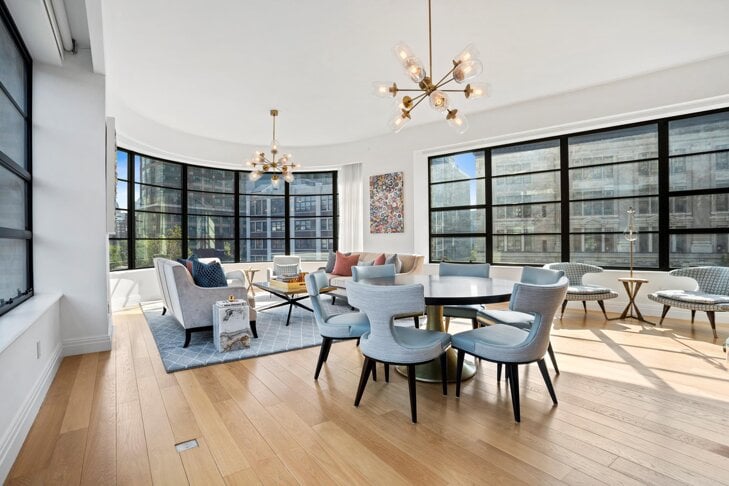9 tips for negotiating your rent when signing a lease in NYC

If you're a renter with a strong application, there's a potential for a reasonable offer.
Emily Myers for Brick Underground
If you’re looking for a rental in New York City, you're probably looking for apartments within your budget—and you may be discouraged. Landlords generally require that you earn an annual salary that's 40 times the monthly rent in order to qualify for an apartment—a tall order indeed. But did you know that negotiating the rent or concessions is pretty common?
The ability to negotiate your rent or ask for other freebies when signing a lease is something you'll see more of when the market favors renters, like during the early months of the pandemic, when many were able to grab concessions like three or four months of free rent. Now, however, there's more competition for apartments and the market has rapidly shifted to favoring landlords, says Brian Hourigan, managing director of BOND New York.
Even so, he says, if you're a renter with a strong application, there's room for reasonable offers regardless of current market conditions.
Scott Elyanow, a broker with Compass, says it is always worth trying to negotiate—in any market. “It’s always the time, it really depends on the renter’s personal situation,” he says. Slicing $50 or $100 off the rent can amount to real savings over the span of the lease.
If you’re looking to negotiate with your landlord when signing a lease, here’s how to prepare and what to do next.
1. Do your research about the rental market
Being prepared is the key to any successful negotiation, says Mike Walker, a residential sales manager at R New York who recently shared his negotiating tips on the Brick Underground podcast. That means you need to know the market: If there’s low inventory and rents are increasing, it’s a sign landlords have the upper hand.
Having said that, it's always worth a shot to negotiate your rent. Know the difference between gross and net effective rent. (Net effective includes concessions like a month free factored into the monthly payment).
Jamal Syed, a broker with Living New York, says you can offer to pay a higher gross rent in exchange for getting a free month as a concession. (While a free month or two is very appealing remember that at renewal time, the landlord will use the gross rent as the starting point for any rent increases.) Another option is to see if you can forgo the free rent concessions for a slightly lower gross rent.
To help you work out what your gross rent is on any lease with concessions you can use this handy calculator:

Brick Underground's
Gross Rent Calculator
What's this?
Some New York City landlords offer a free month (or more) at the beginning or end of a lease. The advertised rent is the net effective rent. The net effective rent is less than the amount you will actually have to pay --- known as your gross rent --- during your non-free months.
Brick Underground's Gross Rent Calculator enables you to easily calculate your gross rent, make quick apples-to-apples comparisons between apartments and avoid expensive surprises. All you'll need to figure out your gross rent is 1) the net effective rent, 2) the length of your lease, and 3) how many free months your landlord is offering. [Hint: Bookmark this page for easy reference!]
To learn more about net effective versus gross rents, read What does 'net effective rent' mean?.
If the landlord is offering partial months free, enter it with a decimal point. For example, 6 weeks free rent should be entered as 1.5 months.
Right now, the median concession in Manhattan is 1.6 months free but that will depend on the type of apartment you're renting.
2. Know what you want from a rental
Sure, New Yorkers want a place that’s affordable but perhaps you have additional priorities—you need a pet-friendly rental, or need storage space. An attitude where you’ll only accept one outcome—a lower rent—is unlikely to be successful, Walker says. He advises having a range of possible outcomes that you’ll accept when you’re negotiating and with a rental you might have more success with lifestyle items rather than with dollars off the rent or months for free, particularly when the market is competitive.
For example, you might get a landlord to be flexible about whether you can have a pet. Or perhaps you can get the floors refinished or light fixtures changed before you move in. Consider asking for a free storage locker or bike spot thrown into the deal. Walker has even seen bus passes negotiated into rental agreements.
Looking for a landlord who is flexible about guarantors, pets, or "flexing" a space with temporary walls? Put your search into the capable hands of Triplemint, a tech-savvy real estate brokerage founded by a pair of Yale grads in response to the frustrating apartment-search experiences of classmates and colleagues. Triplemint will charge a broker's fee of 10 percent of a year's rent on open listings instead of the usual 12 to 15 percent if you sign up here. Bonus: The agents at Triplemint are a delight to deal with.
3. Accept an apartment without upgrades
Another way to approach your negotiations is to offer to take the apartment without upgrades for a slightly lower rent. Perhaps the broker at a viewing tells you the landlord plans to update the kitchen or bathroom of the apartment you’re considering. Elyanow says, if you feel the apartment is in good enough condition for you, offer to take it as it is—as long as it is clean—but suggest a slice off the rent.
This approach can also work if the apartment hasn’t been painted yet. Most landlords will refresh the walls with a new coat between rentals but Elyanow says a landlord might offer to lower the rent if you say the apartment doesn’t need painting or offer to paint it yourself.
Similarly, if an apartment has less-desirable white kitchen appliances and the owner says they plan on replacing them with more modern stainless steel ones, you may want to tell the landlord you’re happy with the appliances—as long as they work properly—and will take the apartment with the lower-grade appliance for a lower rent.
4. Have your paperwork ready to go
To put yourself on a strong footing to negotiate you need to have your paperwork ready to go. That means having your most recent tax returns, two recent bank statements, a letter of employment or two recent pay stubs, and a scanned copy of your photo ID.
Walker says it’s all about “being able to present a really strong case and say, you know, here's my job, here's my financials, here's references—this shows that I'm a quality tenant.”
The strength of an application package will always determine a renter's leverage when it comes to negotiating price and other lease terms.
"Given the high level of competition for the most desirable listings, an apartment application is not the time for an individual to be coy or modest about their income or assets," Hourigan says.
5. Offer to move in as soon as possible
Another advantage of being ready to move fast is the opportunity to start the lease within a few days of seeing the apartment. Landlords would rather not have their apartments sitting empty and collecting no rent at all. Elyanow says one of the best ways to negotiate is to offer to move in as soon as you can.
“The person who is ready to go and can start early can negotiate their rent down a little bit,” he says. Trading immediate occupancy for a small rent reduction could allow you to knock $50 or $100 off the rent.
6. Show flexibility on the length of the lease
Landlords in New York typically want leases to start or end in the busier summer months—in this way it will be easier to find another tenant when you move out. If you find an apartment in the winter with a longer lease of 16 to 18 months, Hourigan says you can sometimes trade the flexibility of accepting a longer lease term for a slightly lower rent.
If a rent discount isn't on the table, consider asking for access to building amenities like free or discounted health club or gym membership.
7. Negotiate the second year of a lease
Another opportunity to negotiate is asking for a longer lease. Most landlords don’t want to offer longer leases (unless they begin in the winter) but if you can lock in a good rent and even pre-negotiate the second year, that can give you a bit more security.
“If you say you’ll take the place at one price and $25 more for the next year, that could give the owner a little bit of comfort that it will be rented to a good candidate,” Elyanow says.
The advantage for the landlord is that they won’t have to go through the process of re-renting the place the following year.
8. Offer to pay the broker fee
The broker fee is a one-time payment when you sign your lease. It's not a small amount—around 12-15 percent of the annual rent—but in some cases a landlord will pay this in order to attract renters but then charge a higher rent in return.
Offering to pay the broker fee—even though it might sting at the time—can save money over the long term, especially for the renter who stays for several years.
Here's how it works: Say the asking rent is $2,000 but you negotiate a rent of $1,950 by paying a broker fee (in this case equivalent to one month's rent). The benefit here is you start with a lower gross rent (which affects your renewal rate) and over the course of five years, a savings of $50 per month minus the broker fee leaves you with an additional $1,050 that would have gone to rent.
9. Get advice from a broker
Hiring a broker comes with a price tag but there are often advantages to using their expertise, particularly in a competitive market. Not only can they advocate for you, Hourigan says brokers and agents know there are certain landlords and management companies that are more negotiable on pricing and other lease terms for qualified applicants.
You're less likely to waste your time trying to get a reduced rent at a building that's typically inflexible when it comes to renter negotiations. If a broker is known for working with qualified candidates you might have additional leverage through that association.




























